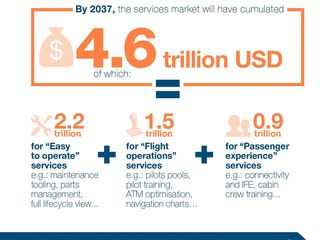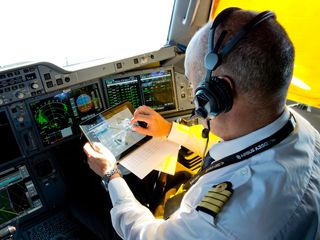Ambitions to boost value to customers and reach $10bn of services revenues in commercial in the next decade
Airbus’ new Global Services Forecast predicts a US$4.6 trillion worldwide market for commercial aircraft services from 2018 to 2037. The new analysis is based on a three-way market segmentation, respectively focusing on the aircraft, the airline operation, and the passenger experience.
Aircraft-focused lifecycle services represent the largest segment of growth and include maintenance, spares pool access, tooling, technical training and system upgrades – which are needed to keep the airlines aircraft flying. This market represents a cumulative value of $2.2 trillion over the 20-year period – from $76 billion in 2018 to more than $160 billion per annum by 2037. These services are provided throughout the lifecycle from design to dismantling. In this category, aircraft manufacturers provide customers with core services which come with the aircraft, including assigned field reps and call centres for AOGs for example. The largest market by value is maintenance, increasingly characterised by outsourcing and “paid-by-the-hour” (PBH) contracts. Moreover, as technology and new materials develop, such as composite repairs, Airbus sees a strong trend for further outsourcing. PBH contracts allow airlines to secure and predict their maintenance costs, allowing airlines to focus on their core business of flying. Airbus also sees airlines increase their outsourcing of inventory management – towards pooling, instead of investing in their own stocks.
The next largest category encompasses flight operations services – such as pilot training and flight-planning solutions – and will account for a $1.5 trillion cumulative spend over 20 years. Fleets are expected to more than double to 48,000 aircraft over this period, such that Airbus estimates a need for 540,000 new pilots in the next 20 years. This trend will require ‘smarter’ ways of training using new digital technologies.
The third component of the global services market centres on the passenger experience which will account for an estimated $0.9 trillion cumulative value over the 20 year period. This encompasses the services needed to optimise the flight experience, including cabin upgrades, cabin crew training, in-flight-entertainment, connectivity and booking. This segment is expected to more than double in the next 20 years and grow from $27bn to almost $70bn. A notable trend is that seamless connectivity will undergo exponential growth, as more and more passengers manage their travel using a smart device, providing them all the information in real-time about the airport, connecting flights, bag collection details etc.
Airbus’ ambition in Services – $10bn in revenues and boosting customer value
After an 18 percent annual growth in its services revenues for the past two years, Airbus’ ambition is to triple its services revenues from more than $3.2bn in 2017 to reach $10bn of services revenues in commercial in the next decade. To attain this goal, Airbus will continue to develop full lifecycle integrated services for all Airbus’ aircraft operators. Furthermore, these integrated services – such as Flight Hour Services (FHS) – will be even more efficient through the Skywise open data platform.
Airbus will also expand its current service portfolio to non-Airbus platforms, given that 62 percent of Airbus’ total fleet is operated by ‘multi-fleet’ operators. An example of this happening today is illustrated by Airbus’ materials management subsidiary Satair, which already has 25 percent of its revenues coming from non-Airbus parts; while the Navblue flight operations subsidiary also delivers multi-fleet services. Furthermore, Airbus will extend services to a wider customer base – such as airports and air traffic control operations. Lastly, Airbus will reinforce its strategic position in the value chain. Another visible facet of Airbus’ growth in its services is the increasingly local presence, ie. being closer to its customers. Airbus’ developing global services footprint now spans 65 locations globally including 17 training centres.
One common denominator, across all the services which Airbus will increasingly cultivate is ‘digitalisation’, with many solutions being interconnected and integrated. These solutions will create additional value for airlines, lessors and MRO companies, for instance by allowing real-time decision-making, or by optimising flight and maintenance operations through analytics.
#ServicesByAirbus #FIA18
Your media contacts
Contact us
Martin Fendt
Trade & Technical Press Specialist - Airbus Commercial Aircraft



